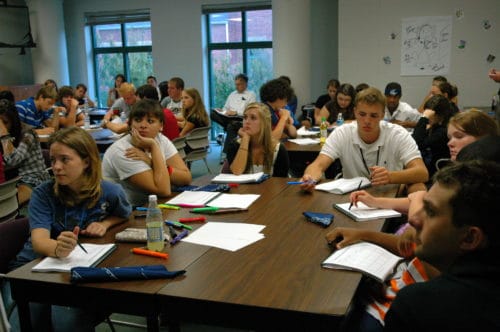Over the years, students have been told over and over that participation is necessary for getting the best education possible. This repetition makes it seem as though participating is the only way to be accountable for the quality and quantity of information received in the classroom. Due to this, participation is graded in many classes.
In a perfect world, the idea of graded participation would work. Every time a professor asked a question or started a discussion, every student would raise his or her hand and pitch in, if for no other reason than to keep his or her grade up. According to every professor that accounts for participation, introversion and shyness would ideally disappear.
However, professors and educators who argue for graded participation are not taking into consideration the different elements present in any given classroom.
To begin with, there are various kinds of students in each class. While there are students who can comfortably speak in front of a room full of their peers, there are also students who have social anxiety. These students physically cannot speak up in class without feeling sick, lightheaded or some other negative side effect. It is traumatic for them to be the center of attention for two people, never mind 30 or more.
As a result, speaking up —even when they understand the material and have something to add to an ongoing discussion — is not only difficult, but takes time. These are the students who may only speak once every other class because it takes everything they have in them to say a few words in a coherent sentence out loud. In many classes though, speaking once every other class can render a low participation grade, which hurts a student’s overall grade as well.
Aside from students who have social anxiety, there are students who are natural introverts. Before going further, understand that introversion is not shyness. It is a complex personality type where the person prefers his or her own company or the company of a few rather than the company of many. These students are deep thinkers. They may not speak until they have a fully- formulated thought or idea.
Understandably, introversion may not seem like a viable excuse for not participating because it is not an illness and does not cause physical, emotion or mental harm like social anxiety does. Still, introverts are just as negatively affected by graded participation as others. Introverts think before they speak, which makes them slower than the rest of the class, who may be fine with speaking out loud or blurting out a passing thought. It is not a bad thing — it is just an entirely different way of thinking and processing.
In a class discussion, an introvert will be mulling over the question or the current topic and, by the time they raise their hand to speak, their answer may not be relevant. The speed at which discussions move can unsettle someone who has social anxiety as well because they will worry if what they want to say is relevant, while an introvert will be thinking through every angle of the subject.
At the same time, participation normally entails speaking up in a class discussion or answering a professor’s question, and most classrooms enforce the “raise your hand” rule. The problem with that is that teachers are not owls or chameleons. They do not have 360-degree vision to see around the classroom, nor can they move their eyeballs independently from each other. Consequently, participation becomes a contest of enthusiasm and speed: who raises their hands first or who appears the most eager to speak.
While one person may speak about one topic, the next person will veer off and speak about another. This can be detrimental to a classroom. Participation can easily become counterproductive to the quality of learning due to the myriad of shifts in subjects in the span of a class period.
There are classrooms where the number of students who will participate in a discussion is higher than those who cannot or will not. Professors in those classrooms will sometimes be unable to hold in-depth discussions because they do not want to disrupt the flow of student analysis or processing that goes on during this time, leaving some of the students in the classroom confused or the subject matter slightly unclear.
Some could argue that, in that case, a confused student could go to a professor during their office hours. In another way, graded participation hurts each student because professors equate participation with effort. Many professors can and will say that if a student does not speak up in class, they are not helping themselves. The quality of help that students receive during office hours lessens as a result because of the preconceived expectation that the professor has placed on their students.
Naturally, graded participation is not completely evil. There are perks and benefits to the practice. For example, students who are fine with speaking out, but are unwilling to because of laziness, are forced to speak up. Grading participation also ensures a classroom discussion does not fall flat. In addition, students are able to grapple with a topic on their own out loud in the presence of a professor.
However, these are benefits only to certain students. This equation leaves out too many variables and important facts, such as the types of students in each classroom, the type of teacher and even the topic of discussion. All this shows that this is not an perfect world, and there are too many factors that are involved and are not being considered for participation to be graded.



